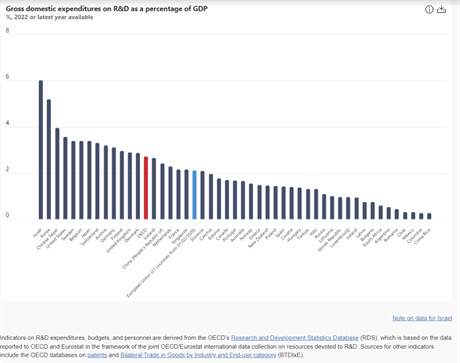Dr Salinger, a climate scientist and adjunct research fellow at the School of Geography, Earth and Environmental Science at Victoria University of Wellington, who was awarded the accolade last month, says New Zealand research and development spending is in crisis.
Government support for research, including much of the climate and environmental research in the $97m per year National Science Challenges, is ending.
Last week the government announced jobs cuts at NIWA, a leader in climate research, the Ministry for the Environment and the Department of Conservation as part of its public sector wide cost savings measures.
“New Zealand already had a generally poor science spending level – shockingly poor,” Salinger says.
“New Zealand’s public science research spend at the moment is one of the lowest in the OECD countries in terms of percentage of GDP. As of 2023 it sat at 1.47%, when the OECD average is 2.73%, UK 2.90% and Australia 1.67%.”

The proposed science cuts reduce the public spend to 1.37%, which will place New Zealand in an even worse position at less than half the OECD average.
“There is a lot of catching up to do if New Zealand wants to keep pace with leading countries in the innovation race and deal properly with climate change. It can only happen when the country’s decision makers and political leaders want it to – the opposite direction to the budget cuts.”
Salinger says that research and development is vitally important as a major source of technical change, which results in new goods, new processes and new knowledge.
“Government and university research have a direct effect on scientific knowledge and public missions, and generate basic knowledge.”
And there are many studies showing that spending on science and innovation can secure a country’s future economic well-being, Salinger says.
“It’s been shown that when you invest in R and D you boost the economy – and I thought this government was all about boosting the economy. The countries that have strong economies also have good investment in science and innovation.”
Uncertain future for climate change science
Climate scientist James Renwick, professor of Physical Geography, Victoria University of Wellington, says the proposed job cuts should be considered as part of a bigger picture of changes to science funding – with the National Science Challenges ending in June and no information on what is happening to that funding.
“The Deep South National Science Challenge funded a lot of NIWA’s good work on climate change responses – will that funding still be available after 30 June? Who knows.”
The performance-based research fund (PBRF) “quality evaluation” round in 2026 has also been cancelled and the Government has announced a review of science structure in New Zealand – but the details are currently vague.
“All of these things add a lot of uncertainty to the science system in New Zealand, including climate change science.”
Renwick says it takes many years to build up a good research team and to develop individual scientists. “Overnight changes in funding or direction can cripple research efforts for decades. I don’t know what the government plans to do, but I would urge them to think and act carefully, to avoid long-term damage to our science infrastructure.”
“Climate science is especially important as we head into a 1.5-degree-plus world, with increasing extreme events and increasing need for resilience and adaptation.”
Top scientists may leave NZ
Troy Baisden, New Zealand Association of Scientists co-president, is worried that as well as the $97 million a year National Science Challenges ending, additional large research programmes will end within 18 months.
“No clear replacements mean an end to many careers in vital areas of climate science when we need more work.”
The country is risking an exodus of environmental scientists. “Top scientists may leave the country and younger researchers may give up on careers in New Zealand related to climate and environment that no longer allow them to pay the mortgage,” Baisden says.
“Addressing climate change requires integrated multidisciplinary research. Rather than cutting the National Science Challenges capacity in climate (Deep South), the ocean around us (Sustainable Seas), our Bioheritage, and Our Land and Water, we should be using climate change as a reason to prioritise and connect pieces of these challenges that can deliver what we need as a nation.”
Loss of science advisor roles raises questions
Baisden says that a decision to cut the chief science advisor role in DOC’s Director-General’s office also signals a significant shift away from an emphasis on achieving evidence-based policy, which started under the John Key government.
“The chief science advisor role in DOC was one of the first in the chief science advisor network developed by successive Prime Minister’s chief science advisors.”
Baisden also understands that the chief economist roles have been cut in MBIE and MPI. “And of course the Productivity Commission reinforced these roles independently but is also gone.”
“This raises concerns not only about long-trusted relationships for science and economics input to policy being strained or no longer desired. It raises questions about the commitment to evidence-based decisions and rigorous cost-benefits analysis in the principles of the coalition agreements.
“One might assume that emissions reductions and other climate change responses will be one of the areas where these commitments were targeted.”
Long-term threat
Internationally renowned climate scientist Kevin Trenberth penned an article in Newsroom on Friday arguing that New Zealand urgently needs to invest in strong climate research. “Climate change is a major long-term threat that requires not only mitigation and adaptation, but information!”
Cuts will have consequences for nature – Forest & Bird
Environmental organisation Forest & Bird is warning that 131 proposed job losses at DOC will have long-term consequences for nature and the economy.
Job cuts were announced the same week the Ministry for the Environment released Our Land 2024, which highlights how New Zealand’s natural resources are under pressure, putting communities and economies at risk.
“The same day that the Government released a report saying that New Zealand communities and economy are at risk if we do not protect our natural ecosystems and landscapes, it announced it was slashing jobs and the budget of the agency that leads government conservation work,” says Forest & Bird Advocacy Group Manager, Richard Capie.
He says New Zealand cannot afford to lose highly trained staff who are protecting threatened species and their habitats.
“We know that investing in nature-based solutions, increasing wetland protection, and controlling browsing mammals reduces the impacts of climate events and improves our ability to reduce emissions.”
Capie says the changes don’t make sense environmentally or economically. “Not only do we have a government axing environmental protections through its fast-track reforms, but we also now have the prospect of these cuts during a climate and biodiversity crisis.”
DOC’s resources are already stretched. “DOC’s budget is about the same as the Christchurch City Council’s, but we expect it to look after a third of Aotearoa. Public conservation land is also incredibly important to our economy.”
Capie points out that New Zealand’s “clean, green” environment underpins the country’s primary industries as well as freshwater, tourism, and living standards. “The Sustainable Business Council estimates that 70% of Aotearoa New Zealand’s exports depend on natural resources. The World Economic Forum estimates that more than half of global economic output (approximately US$44 trillion) is moderately or highly dependent on nature.”
Capie says there will be even more pressure on volunteer-led community groups to pick up the slack.
- SEO Powered Content & PR Distribution. Get Amplified Today.
- PlatoData.Network Vertical Generative Ai. Empower Yourself. Access Here.
- PlatoAiStream. Web3 Intelligence. Knowledge Amplified. Access Here.
- PlatoESG. Carbon, CleanTech, Energy, Environment, Solar, Waste Management. Access Here.
- PlatoHealth. Biotech and Clinical Trials Intelligence. Access Here.
- Source: https://www.carbonnews.co.nz/story.asp?storyID=31264
- :has
- :is
- :not
- :where
- $UP
- 1
- 2%
- 2023
- 2026
- 30
- a
- ability
- About
- achieving
- Act
- adaptation
- add
- Additional
- adjunct
- advisor
- advisors
- advocacy
- afford
- After
- agency
- agreements
- All
- allow
- already
- also
- an
- analysis
- and
- announced
- approximately
- ARE
- areas
- around
- article
- AS
- Association
- assume
- At
- Australia
- available
- average
- avoid
- awarded
- away
- basic
- BE
- been
- being
- bigger
- bird
- boost
- boosting
- Browsing
- budget
- build
- business
- but
- by
- CAN
- cannot
- Capacity
- careers
- carefully
- catching
- challenge
- challenges
- change
- Changes
- chief
- City
- clear
- Climate
- Climate change
- CO
- coalition
- commission
- commitment
- commitments
- Communities
- community
- Concerns
- Connect
- Consequences
- CONSERVATION
- considered
- controlling
- Cost
- cost savings
- Council
- countries
- country
- country’s
- course
- crisis
- Currently
- Cut
- cuts
- cutting
- damage
- day
- deal
- decades
- decision
- decisions
- deep
- deliver
- Department
- depend
- dependent
- desired
- details
- develop
- developed
- Development
- direct
- direction
- do
- Dont
- during
- earth
- Economic
- Economic Forum
- economically
- Economics
- economies
- Economist
- economy
- Ecosystems
- effect
- efforts
- Emissions
- emphasis
- end
- ending
- Environment
- environmental
- environmentally
- especially
- estimates
- Ether (ETH)
- Even
- events
- Exodus
- expect
- exports
- extreme
- fellow
- First
- For
- forest
- Forum
- Friday
- from
- fund
- funded
- funding
- future
- GDP
- generally
- generate
- geography
- Give
- Global
- Global Economic
- gone
- good
- goods
- Government
- Govt
- Group
- Group’s
- had
- Half
- happen
- Happening
- Have
- head
- highlights
- highly
- hinder
- How
- HTTPS
- i
- if
- Impacts
- important
- improves
- in
- Including
- increasing
- incredibly
- independently
- individual
- industries
- information
- Infrastructure
- Innovation
- input
- integrated
- into
- Invest
- investing
- investment
- IT
- ITS
- james
- Job
- job cuts
- Jobs
- John
- june
- Keep
- Key
- Know
- knowledge
- knows
- Land
- landscapes
- large
- Last
- leader
- leaders
- leading
- Leads
- Leave
- less
- Level
- living
- long-term
- longer
- Look
- lose
- losses
- Lot
- lowest
- major
- make
- Makers
- manager
- many
- May..
- mean
- measures
- might
- million
- ministry
- missions
- mitigation
- moment
- Month
- months
- more
- Mortgage
- much
- multidisciplinary
- nation
- National
- National Science
- Natural
- Nature
- Need
- needs
- network
- New
- New Zealand
- no
- now
- ocean
- OECD
- of
- Office
- on
- ONE
- only
- opposite
- or
- organisation
- Other
- our
- out
- output
- Pace
- part
- Pay
- penned
- per
- percentage
- physical
- pick
- picture
- pieces
- Place
- plans
- plato
- Plato Data Intelligence
- PlatoData
- points
- policy
- political
- poor
- position
- pressure
- primary
- Prime
- principles
- prioritise
- processes
- productivity
- Professor
- programmes
- properly
- proposed
- prospect
- protect
- protecting
- protection
- public
- Putting
- Questions
- R
- Race
- raises
- rather
- reason
- reduce
- reduces
- reductions
- reinforced
- related
- Relationships
- released
- Renowned
- report
- requires
- research
- research and development
- researchers
- resilience
- Resources
- response
- responses
- Results
- review
- Richard
- rigorous
- Risk
- risking
- Role
- roles
- round
- s
- same
- Savings
- saying
- says
- School
- Science
- scientific
- Scientist
- scientists
- sector
- secure
- sense
- shift
- should
- showing
- shown
- signals
- significant
- slack
- slashing
- Solutions
- Source
- South
- spend
- Spending
- Staff
- standards
- started
- Still
- stretched
- strong
- structure
- studies
- support
- sustainable
- system
- takes
- targeted
- team
- Technical
- terms
- than
- that
- The
- the world
- their
- Them
- There.
- These
- things
- Think
- Third
- this
- thought
- threat
- Through
- to
- Tourism
- trained
- Trillion
- Uk
- Uncertainty
- under
- understands
- university
- urgently
- us
- using
- Victoria
- vital
- want
- wants
- warning
- was
- Water
- we
- week
- WELL
- were
- What
- What is
- when
- which
- WHO
- wide
- will
- with
- within
- Work
- world
- World Economic Forum
- worried
- worse
- would
- year
- years
- you
- Younger
- Zealand
- zephyrnet











